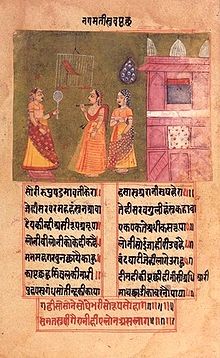Wikijunior:Languages/Hindi
What writing system(s) does this language use?
[edit | edit source]
Hindi does not use Latin characters like the English you are reading, but instead uses a script called devanagari. Devanagari is a type of writing system, called an abugida, where the base character is a syllable that includes a consonant and a vowel. The first consonant in devanagari is क, which stands for the sound "ka". The character can be changed to use different vowels. For example का कि की कु कू के कै को कौ are the k character with each of the main vowels in Hindi. There is also a different form of the vowels when they appear at the beginning of a word or as the second of a pair of vowels. The basic vowels are अ आ इ ई उ ऊ ए ऐ ओ and औ.
How many people speak this language?
[edit | edit source]There are varying estimates for how many people speak Hindi. It is estimated to be between the second and fourth most commonly spoken language in the world. The number of native speakers varies depending on whether or not very closely related dialects are counted. Estimates range from 340 million to 500 million speakers, and as many as 800 million people can understand the language. Hindi and Urdu are similar in vocabulary but different in script; in everyday conversations, speakers of both languages can usually understand each other. There are 60 to 100 million speakers of Urdu.
Where is this language spoken?
[edit | edit source]
Almost all speakers of Hindi live in India or Nepal, though Hindi can be found all over the world where its speakers have moved to. Countries outside of India and Nepal with a significant number of speakers are South Africa, Mauritius, the United Kingdom, the United States, Yemen, and Uganda.
What is the history of this language?
[edit | edit source]Hindi has its roots in the ancient language of Sanskrit. The spoken language changed over the centuries from the Old Indo-Aryan such as Sanskrit to Middle Indo-Aryan Prakrit languages. During its changes, Middle Indo-Aryan became known as Apabhramshas (according to many researchers), which sometime around 1000 A.D. were developing into the dialects and languages of today's northern India, including Hindi. Hindi contains plenty of words from Persian and Arabic origins, coming from the Persian people that ruled much of northern India for centuries.
Who are some famous authors or poets in this language?
[edit | edit source]Tulsidas wrote twelve books and is considered the greatest and most famous of Hindi poets. He lived from 1532 to 1623. Premchand is one of the greatest literary figures of modern Hindi and Urdu literature. He lived from 1880 to 1936. Most of the early Hindi literature was in verse form, like poetry.
What are some basic words in this language that I can learn?
[edit | edit source]Hindi word — Latin version of the word — English translation
- नमस्ते — namaste — hello, good morning, afternoon, etc., and goodbye.
- आप कैसे हैं? — aap kaise hain? — How are you?
- मैं ठीक हूँ, और आप? — main Theek hoon, aur aap? — I am fine, and you?
- आपका नाम क्या है? — aapka naam kyaa hai? — What is your name?
- मेरा नाम सुनील है — meraa naam Sunil hai. — My name is Sunil.
- मैं विद्यालया जा रहा हूँ-main vidyalaya jaa raha hun.-I am going to School.,
The word order in Hindi sentences is different than in English. In Hindi the verb usually comes last in the sentence. For example in the sentence given above for "What is your name?", the order the words are actually said in Hindi is "your name what is". Aapka means "your", naam means "name", kyaa means "what", and hai means "is". With practice this difference isn't very hard to get used to.
What is a simple song/poem/story that I can learn in this language?
[edit | edit source]मछली जल की रानी है
Fish is the queen of water
[edit | edit source]In Devanagri
मछली जल की रानी है,
जीवन उसका पानी है,
हाथ लगाओ तो डर जाएगी,
बाहर निकालो तो मर जाएगी।
In Latin
Machhli jal ki raani hain,
Jeevan uskaa paani hain,
Haath lagao to darr jayegi,
Bahar nikalo to mar jayegi.
Translation
Fish is the queen of water,
Her life is water,
touch her (with your hand) and she will get scared,
take her out and she will die.
References
[edit | edit source] |
Wikijunior:Languages | edit | |
|
Introduction •
Glossary •
Authors and Contributing •
Print Version
| |||